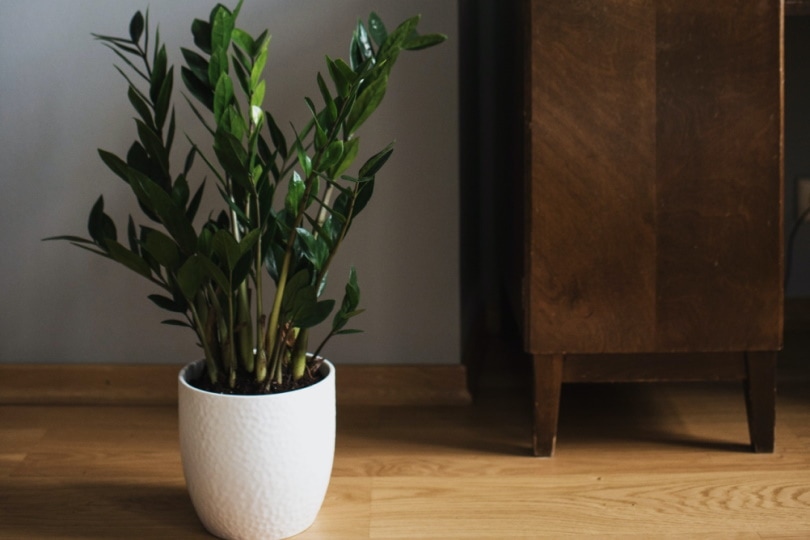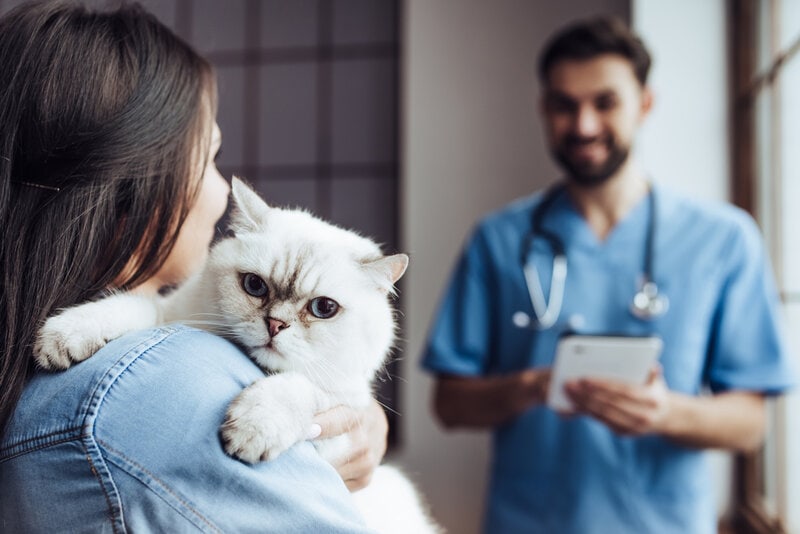
With its gorgeous dark leaves, the Zamioculcas Zamiifolia or ZZ plant is a popular houseplant that can stand up to some neglect and thrive in low-light environments. Unfortunately, this common plant is considered toxic to cats, other pets, and humans.
How Dangerous Is the ZZ Plant?
The Zamioculcas Zamiifolia plant is mildly poisonous to cats, dogs, and people if it is directly ingested. If you have a cat and a ZZ plant at home, don’t panic just yet! You should know that even though this plant is toxic to cats, it won’t seriously harm your feline, but it could make him feel sick.
Certainly, you don’t want your cat to feel sick any more than you want to keep a poisonous plant in your home. Therefore, the logical thing to do is get rid of your ZZ plant so your cat doesn’t get sick from eating the leaves or stems of this common houseplant.

What Makes the ZZ Plant Dangerous?
The leaves, stems, and roots of the ZZ plant contain a substance called calcium oxalate. This is a crystal-like substance that causes a burning irritation when it comes into contact with a cat’s mucous membranes. When this substance is consumed by a cat, it causes discomfort and swelling in the mouth, which typically prompts the cat to spit the plant out.
When a cat swallows a part of a ZZ plant, the animal may suffer from systemic illness, leading to an upset stomach, vomiting, and diarrhea. The severity of the reaction depends on how much of the plant is ingested. These symptoms generally only last a couple of hours and are manageable.
If you catch your cat eating part of a ZZ plant, check his mouth to remove any pieces you may find. Then wash your cat’s mouth with plenty of water. If he develops vomiting and/or diarrhea, wait it out. Your cat should recover and be just fine in a matter of a few hours.
Other Plants Toxic to Cats
Plants can add a lot of ambiance to a home but if you’re a cat owner, it’s important to know what houseplants are toxic before bringing them into your home.
In many cases, plants that are toxic to cats may cause stomach upset or skin irritation. However, in serious cases, cats can suffer from organ failure, seizures, or even death when they eat toxic plants.
Below are some of the most common houseplants you should avoid bringing into your home if you have a cat. All the plants listed below are toxic to cats with some even being life-threatening so avoid them at all costs!
What Plant Can Kill a Cat
If you’re wondering what plant can kill a cat, it’s the Nerium oleander plant. This plant, which is most commonly known as simply the oleander, is a beautiful shrub that’s often used as an ornamental and landscaping plant.
All parts of the oleander plant are extremely toxic to cats including the leaves, stems, and flowers. If a cat were to eat part of an oleander plant, the animal could experience a wide range of signs including:
What to Do if Your Cat Chews On or Eats a Toxic Plant
If you think your cat has chewed on or eaten a potentially toxic plant, there’s no time to waste! A good idea is to take a photo of the plant and contact your veterinarian for help.
Despite what you may have read online, you should never induce vomiting in a cat using hydrogen peroxide or ipecac. Leave the treatment up to your veterinarian who knows exactly what to do. Even if you find out that your cat’s health was never jeopardized, it’s always better to be safe than sorry.

Conclusion
ZZ plants are hearty and beautiful, but they are toxic to cats. If you’re a cat owner, it’s best not to have a ZZ plant in your home because your cat could get sick if he were to eat some of the plant. Keep in mind the fact that ZZ plants aren’t the only plants harmful to cats! Do your homework and learn what other plants to avoid so your cat doesn’t become ill.
Featured Image Credit: MART PRODUCTION, Pexels








